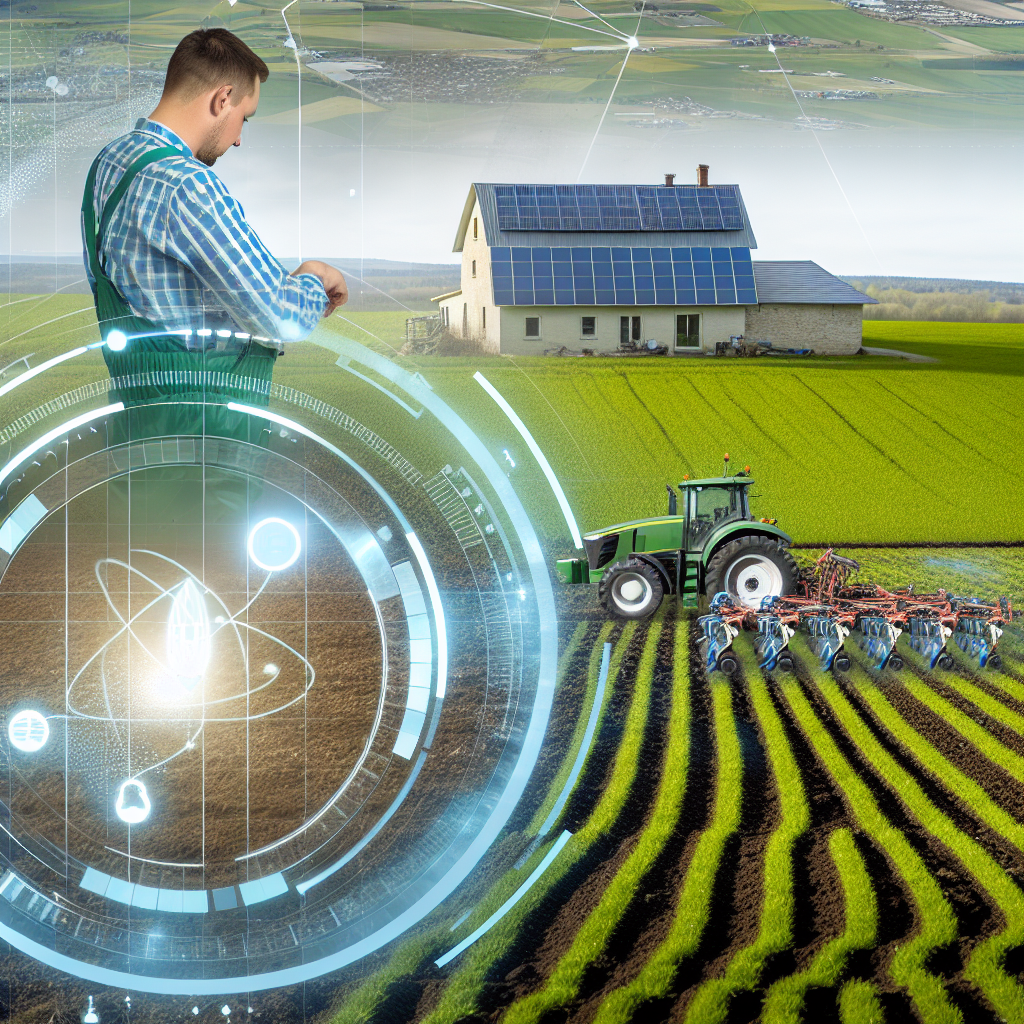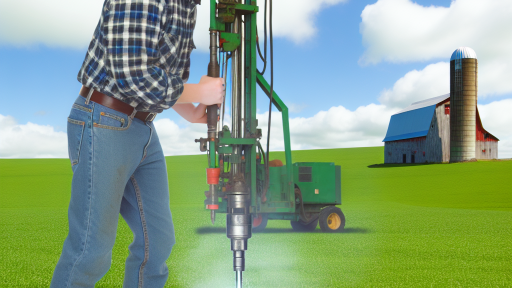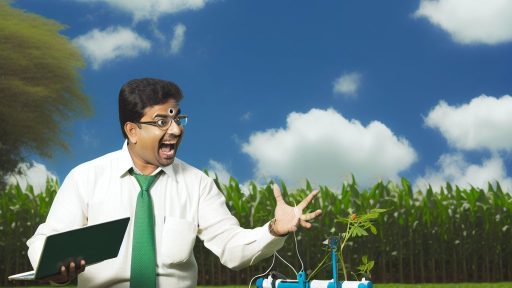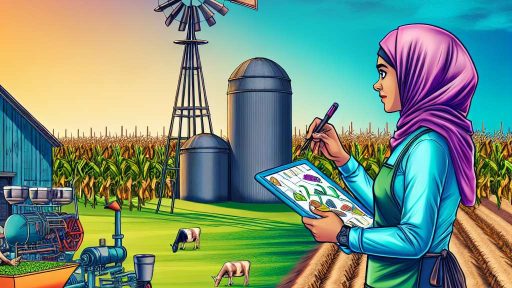Introduction to Smart Farming
Smart farming leverages technology to improve agriculture.
It encompasses various tools and methods aimed at increasing efficiency and sustainability.
Farmers utilize data-driven insights to make informed decisions.
As a result, crop yields have improved dramatically in recent years.
Definition of Smart Farming
Smart farming involves using advanced technologies like IoT and AI.
These technologies help monitor and manage farms effectively.
Additionally, they support precision farming practices.
This approach optimizes resources and minimizes waste.
Importance of Smart Farming
Smart farming plays a crucial role in food production today.
It addresses the challenges posed by climate change and population growth.
Moreover, it helps farmers adapt to changing market demands.
Efficiency gains lead to higher profitability for farmers.
Also, it promotes environmental sustainability.
Key Technologies in Smart Farming
Internet of Things (IoT)
The Internet of Things (IoT) plays a vital role in smart farming.
IoT devices enhance connectivity between farmers and their equipment.
Transform Your Agribusiness
Unlock your farm's potential with expert advice tailored to your needs. Get actionable steps that drive real results.
Get StartedThey gather real-time data from various farm operations.
This data improves decision-making across the board.
IoT sensors monitor soil moisture and crop health efficiently.
For example, sensors can detect when irrigation is needed.
As a result, farmers save water and increase yields.
Additionally, IoT systems enable remote monitoring of farms.
This allows farmers to manage their operations from anywhere.
Drones
Drones are revolutionizing the way farmers survey their fields.
They capture high-resolution aerial imagery quickly.
Farmers use this imagery for crop health analysis.
Drones can identify pests and diseases early on.
This timely information helps mitigate potential losses.
Moreover, drones assist in precision agriculture practices.
They enable targeted spraying of fertilizers and pesticides.
This leads to less waste and minimal environmental impact.
As drone technology advances, their applications continue to expand.
Robotics
Robotics is another key technology in smart farming.
Automated machinery reduces the need for manual labor.
Farmers can deploy robotic systems for planting and harvesting.
These machines improve efficiency and reduce human error.
Additionally, robotics facilitate the use of precision techniques.
They ensure proper spacing and depth during planting.
This accuracy boosts crop growth and overall productivity.
Moreover, innovative robotics are designed to work tirelessly.
Showcase Your Farming Business
Publish your professional farming services profile on our blog for a one-time fee of $200 and reach a dedicated audience of farmers and agribusiness owners.
Publish Your ProfileThis allows farmers to focus on other critical tasks.
Benefits of Smart Farming Tools
Increased Efficiency
Smart farming tools enhance operational efficiency on farms.
Automated systems reduce manual labor requirements.
This technology streamlines various farming processes.
As a result, farmers can manage their time more effectively.
Precision agriculture also minimizes resource wastage.
By analyzing data, farmers can make informed decisions.
This data-driven approach optimizes crop management strategies.
Boosted Yield
Smart tools significantly improve crop yields.
Sensors monitor soil health and moisture levels accurately.
This information helps farmers apply the right amount of water and nutrients.
Consequently, plants receive optimal growth conditions.
Advanced technologies also allow for better pest control.
By detecting pest infestations early, farmers can act quickly.
This timely intervention prevents crop losses.
Environmental Sustainability
Smart farming practices support sustainable agriculture.
Reduced chemical usage minimizes environmental impact.
Farmers can use data to apply fertilizers more efficiently.
This targeted approach promotes healthier ecosystems.
Furthermore, smart farming fosters biodiversity on farms.
Integrated systems encourage crop rotation and polyculture.
Ultimately, these practices lead to sustainable farming operations.
Learn More: Pest Resistance In Genetically Modified Crops Explained
Sustainability in Agriculture: How Smart Tools are Contributing
Introduction to Smart Farming
Smart farming utilizes technology to enhance agricultural practices.
It incorporates tools that improve efficiency and sustainability.
Furthermore, these tools help farmers make better decisions.
Data-Driven Decision Making
Data analytics plays a crucial role in smart farming.
Farmers collect data from sensors in the fields.
This data helps identify crop health and soil conditions.
Consequently, farmers can optimize resource usage.
For example, precision irrigation minimizes water waste.
Drones in Agriculture
Drones are becoming an essential tool on farms.
They provide aerial imagery for crop monitoring.
This technology allows farmers to assess plant health quickly.
Moreover, drones enhance the accuracy of pesticide application.
Farmers can treat specific areas, reducing chemical use.
Soil Health Monitoring
Smart sensors are vital for monitoring soil health.
These sensors measure moisture levels, pH, and nutrients.
Such data enables farmers to make informed decisions.
Healthy soil promotes crop growth and environmental stability.
Showcase Your Farming Business
Publish your professional farming services profile on our blog for a one-time fee of $200 and reach a dedicated audience of farmers and agribusiness owners.
Publish Your ProfileEnergy Efficiency through Technology
Renewable energy sources are increasingly integrated into farming.
Solar panels power irrigation systems and farm equipment.
As a result, farmers reduce their carbon footprint.
Energy-efficient practices also lower operational costs.
Smart Livestock Management
Technology aids in managing livestock health effectively.
Wearable devices track animal movement and health metrics.
This information helps farmers address health issues promptly.
Additionally, it enhances overall animal welfare.
Advancements in Sustainable Practices
Smart farming tools revolutionize traditional agricultural methods.
They promote sustainability through efficient resource management.
Moreover, farmers are better equipped to face challenges.
Smart farming contributes to a more sustainable future.
See Related Content: How IoT Enhances Precision Farming Techniques
Case Studies: Successful Implementation of Smart Farming Practices
Introduction to Smart Farming Applications
Smart farming utilizes technology to enhance agricultural productivity.
It incorporates tools that support decision-making and improve efficiency.
Successful case studies demonstrate the effectiveness of these practices.
The Sanchez Family Farms Experience
The Sanchez family implemented precision agriculture techniques in their operations.
They used GPS technology to optimize tractor routes.
This minimized fuel consumption and saved time during planting and harvesting.
Moreover, sensor-equipped irrigation systems improved water usage.
As a result, they reduced water waste and enhanced crop yields.
The GreenFuture Collective Initiative
The GreenFuture Collective adopted data analytics for better crop management.
This organization analyzed soil health and weather patterns to guide farming practices.
They utilized drones to monitor crop health effectively.
Consequently, they were able to address pest issues promptly.
This strategy increased both efficiency and sustainability in their practices.
Tech Innovations at Meadowlark Farms
Meadowlark Farms focused on integrating IoT devices within their operations.
Sensors tracked environmental conditions continuously to monitor plant health.
This real-time data allowed farmers to respond immediately to changing needs.
In doing so, they minimized the use of fertilizers and pesticides.
Ultimately, this resulted in healthier crops and increased consumer interest.
Lessons Learned from Successful Implementations
Each case study underscores the importance of technology adoption in agriculture.
Farmers who leverage smart tools see immediate benefits in efficiency.
Furthermore, they contribute positively to environmental sustainability.
Collaboration and knowledge sharing among farmers enhance success rates.
These experiences provide valuable insights for future advancements in smart farming.
Learn More: Connecting Farmers To Global Markets With Blockchain Technology

Challenges and Barriers to Adoption of Smart Farming Tools
Technological Limitations
Many farmers face challenges with outdated technology.
Older equipment often lacks compatibility with new smart farming tools.
This incompatibility hinders efficient integration of innovations.
Showcase Your Farming Business
Publish your professional farming services profile on our blog for a one-time fee of $200 and reach a dedicated audience of farmers and agribusiness owners.
Publish Your ProfileAdditionally, limited access to high-speed internet affects remote monitoring.
This situation makes it difficult for farmers to adopt smart solutions.
Cost Considerations
Investment in smart farming tools can be substantial.
Costs include purchasing equipment and training personnel.
Small-scale farmers often struggle to secure funding for such investments.
This financial barrier can prevent them from modernizing operations.
Moreover, uncertainties about returns on investment deter farmers.
Knowledge and Training Gaps
Many farmers lack necessary knowledge about smart farming technologies.
This gap can lead to underutilization of available tools.
Training programs must be accessible and tailored to local needs.
Networking with technology experts can help bridge this knowledge gap.
Encouraging local educational initiatives can also promote adoption.
Resistance to Change
Some farmers may resist adopting new technologies due to tradition.
This resistance often arises from fear of the unknown.
Additionally, older generations may be hesitant to change their methods.
Building trust in new systems can alleviate these concerns.
Demonstrating success stories can encourage broader acceptance.
Environmental Regulations
Navigating regulatory hurdles can complicate adoption.
Farmers must comply with various environmental regulations.
These regulations can limit the types of technology that can be implemented.
Furthermore, adapting to evolving legislation can be challenging.
Understanding these restrictions is crucial for effective planning.
You Might Also Like: AI Technologies Transforming Agriculture
Future Trends in Smart Farming
Emerging Technologies
Smart farming will leverage innovative technologies in the future.
Artificial intelligence will play a crucial role in data analysis.
Farmers will utilize machine learning to make informed decisions.
Robotics will automate various farming tasks efficiently.
Drone technology will provide real-time monitoring of crops.
Precision Agriculture
Precision agriculture will become increasingly popular among farmers.
This method enables targeted interventions based on data insights.
Farmers will optimize resource use, including water and fertilizers.
Ultimately, this approach boosts both efficiency and sustainability.
Integration of IoT
The Internet of Things (IoT) will revolutionize farming practices.
Sensors will collect valuable data about soil and weather conditions.
Farmers will adjust their practices based on real-time information.
This integration will lead to smarter resource management.
Data-Driven Decision Making
Data-driven decision making will transform traditional farming methods.
Farmers will rely on analytics to drive productivity improvements.
Big data will unlock new insights into crop performance.
Consequently, this approach will enhance overall yield.
Showcase Your Farming Business
Publish your professional farming services profile on our blog for a one-time fee of $200 and reach a dedicated audience of farmers and agribusiness owners.
Publish Your ProfileSustainable Practices
Sustainability will remain at the forefront of future farming trends.
Farmers will adopt regenerative agricultural practices increasingly.
These practices focus on enhancing soil health and biodiversity.
Moreover, they will reduce the carbon footprint of agriculture.
Collaborative Platforms
Collaboration will lead to progress in the smart farming landscape.
Farmers will join forces with tech companies and researchers.
This collaboration will foster innovation in farming tools and techniques.
Shared knowledge will empower farmers to adopt best practices.
The Role of Smart Farming in Sustainable Agriculture
Enhancing Resource Efficiency
Smart farming technologies optimize resource usage on farms.
Precision agriculture ensures water and fertilizers are used efficiently.
This approach reduces waste and minimizes environmental impact.
Farmers can manage inputs more effectively with smart sensors.
Consequently, crop yields improve while conserving resources.
Reducing Environmental Footprint
Integration of smart farming tools leads to lower greenhouse gas emissions.
This is achieved through efficient energy usage and management practices.
Additionally, reduced chemical use contributes to sustainability.
As a result, soil and water quality can improve over time.
Promoting Biodiversity
Smart farming supports the cultivation of diverse crop species.
By using data analytics, farmers can make informed decisions on crop rotation.
This practice enhances soil health and promotes beneficial microorganisms.
Ultimately, biodiversity strengthens ecosystems on and around farms.
Boosting Economic Viability
Investing in smart farming tools increases overall farm productivity.
In turn, this leads to greater profitability for farmers.
Efficient operations reduce labor costs and operation times.
Moreover, farmers gain better access to market information through technology.
Embracing Technological Innovation
The advancement of technology paves the way for smarter practices.
Drones, IoT devices, and data analytics enhance decision-making processes.
This continual innovation fosters a sustainable agricultural future.
Collaboration among farmers, technologists, and researchers is essential.
Additional Resources
Precision Agriculture: Benefits and Challenges for Technology …




